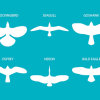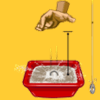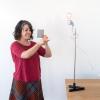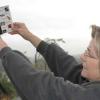Search Results
Showing results 1 to 16 of 16

The Old White Sheet Trick: Light and Insect Behavior
Source Institutions
In this outdoor, nighttime activity, learners gather around a brightly lit, white surface and study the behavior of nocturnal animals attracted to the light, particularly night fliers.

Sensory Hi-Lo Hunt
Source Institutions
In this outdoor activity, learners use only their senses to to find the extremes of several environmental variables or physical factors: wind, temperature, light, slope and moisture.

Pringles Pinhole Camera
Source Institutions
An ordinary camera has a lens that makes an image on film. In a pinhole camera, a small hole replaces the lens.

Control a Bird’s Flight
Source Institutions
In this engineering design challenge, learners make a bird and then control its flight with attached strings.

Make a Green Gumball Black
Source Institutions
In this optics activity, learners use a shoebox, colored cellophane and sunlight to "change" the colors of gumballs. Learners will be surprised when the green and blue gumballs appear black!

Comet Cratering
Source Institutions
Make impact craters with marbles (or rocks or washers) in a container of flour. Find out what you can learn about your "comets" by the craters they make.

Ocean Echolocation
Source Institutions
Use echolocation to find others and experience how whales’ senses have adapted to suit their environment. In pairs, learners are blindfolded and use containers filled with marbles to find each other.

Polarized Sunglasses
Source Institutions
In this activity, learners explore how polarizing sunglasses can help diminish road glare.

Personal Pinhole Theater
Source Institutions
Have you ever heard of a camera without a lens? In this activity, learners create a pinhole camera out of simple materials. They'll see the world in a whole new way: upside down and backwards!
River Catcher
Source Institutions
In this activity (located at the top of the page), learners make an easy river strainer and see what they can catch.

A Degrading Experience
Source Institutions
In this activity on page 27, learners perform an experiment to learn about how different types of marine debris degrade and how weather and sunlight affect the rate of degradation.

Save Your Skin
Source Institutions
This is a fun activity about the power of the Sun and the importance of using sunscreen to protect your sensitive skin from its rays.

ANTacid: Indicator Paper on an Anthill
Source Institutions
In this activity, learners make acid/base indicator paper, place the indicator paper on an anthill, disturb a bunch of ants, and then observe what happens!

Canned Heat
Source Institutions
In this activity, learners explore how light and dark colored objects absorb the Sun's radiations at different rates.

Ready to Observe: Enhance Your Telescope Experience
Source Institutions
This fun hands-on astronomy activity uses a variety of simple props to help learners understand why they see what they see in a telescope.

As Straight as a Pole
Source Institutions
In this engineering activity (page 3 of PDF), young learners investigate how a pole can be made stable by “planting” its base in the ground or adding supports to the base.
